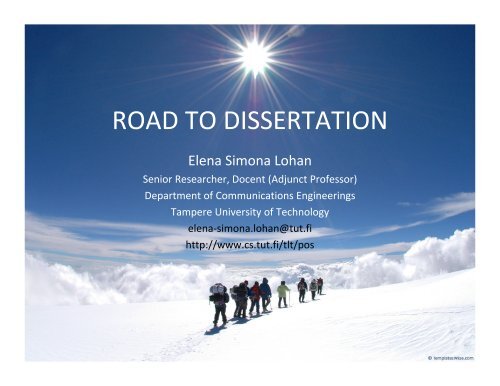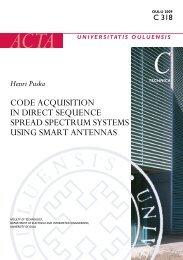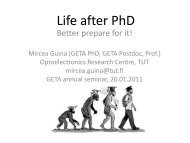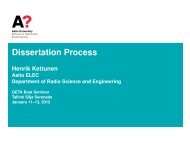ROAD TO DISSERTATION
ROAD TO DISSERTATION
ROAD TO DISSERTATION
You also want an ePaper? Increase the reach of your titles
YUMPU automatically turns print PDFs into web optimized ePapers that Google loves.
<strong>ROAD</strong> <strong>TO</strong> <strong>DISSERTATION</strong><br />
Elena Simona Lohan<br />
Senior Researcher, Docent (Adjunct Professor)<br />
Department of Communications Engineerings<br />
Tampere University of Technology<br />
elena‐simona.lohan@tut.fi<br />
http://www.cs.tut.fi/tlt/pos
Outline<br />
• Who am I? Why Finland?<br />
• My GETA experience<br />
• PhD research stages:<br />
‣ Research and publish<br />
‣ Make a plan for Dissertation (target research<br />
results, target number of publications,…)<br />
‣ Actual writing<br />
‣ Dissertation day<br />
‣ After Dissertation<br />
‣ My experience as a woman<br />
researcher in Finland
Who am I?<br />
• Born and raised in Bucharest,<br />
Romania<br />
• 1992-1997: Engineering degree (equivalent of MSc) in 1997 from<br />
«Politehnica» University of Bucharest (in electrical engineering)<br />
• 1997-1998: DEA (equivalent of MSc) from Ecole Polytechnique,<br />
Paris, France, in 1998, after 2-year study in Paris (in Optimization,<br />
game theory, and economical modelling)<br />
• 1998-2003: PhD from Tampere University of Technology (TUT) in<br />
2003 (in wireless communications)<br />
• Since 2003: Senior Researcher, lecturer and technical project<br />
leader at TUT, Department of Communications Engineering.<br />
Nominated in 2007 as a Docent (Adjunct Professor) for 5 years.<br />
Research field: signal processing for wireless positioning<br />
(especially satellite-based positioning)
Why Finland?<br />
The 3 ’S’s: Summer, Sauna, Simplicity
My GETA experience<br />
• GETA student between Aug<br />
2000- Jul 2003<br />
• Participant at 2 GETA courses during my PhD: a ‘core’ course in<br />
telecommunications at Ruka and a course on satellite positioning<br />
in Helsinki<br />
• Attending 3 GETA boat seminars during my PhD studies<br />
• Organizer of a GETA-funded course on ‘Wireless positioning’ at<br />
TUT (summer 2009)
Family in Finland<br />
Husband: Florin.<br />
• Also a former GETA student.<br />
• Now working at Nokia.<br />
• Also co-founder of a small company<br />
focusing on products for the distribution of<br />
digital TV: Ondems.<br />
• Also the author of the MLauncher, a music<br />
player for S60 phones (free download at<br />
http://www.mlauncher.org/)<br />
Daughter: Iris (b. 2007).<br />
• In (Finnish) kindergarten
PhD research stages:<br />
Research and publish (I)<br />
• Your research topic and directions of research are not the<br />
sole responsability of your supervisor -> keep track of<br />
state-of-art results in your field and look for innovative<br />
ideas:<br />
• On-line magazines, news articles<br />
• IEEE database: http://ieeexplore.ieee.org<br />
• The scientific literature digital library Citeseer<br />
http://citeseer.ist.psu.edu/<br />
• Patent databases, e.g.,<br />
http://www.freepatentsonline.com/<br />
• Look actively for cooperation and/or exchange of ideas with<br />
other research units in Finland and abroad (e.g., web<br />
searches, during conference attendance, …) -> fresh<br />
thoughts
PhD research stages:<br />
Research and publish (II)<br />
• Where to publish?<br />
• http://www.wikicfp.com/: Wiki Call for Papers in various areas; for<br />
both conferences and journals<br />
• http://edas.info/: after creating an account you can see many<br />
upcoming CFPs (conferences/journals), mostly in signal processing<br />
and telecommunications fields<br />
• http://www.ieee.org: links to various IEEE conferences and journals<br />
• http://www.eurasip.org/ : EURASIP journals, typically with specific<br />
CFPs (faster publication)<br />
• Discuss with your supervisor and colleagues about average<br />
review times in chosen journals<br />
• Chose a conference not only according to location, but mostly<br />
according to its significance (relevance to the research field,<br />
impact factor)<br />
-> this is important especially if you think about an Academic career; it’s<br />
also important to make contacts with people in your research field<br />
(opportunity for future common projects)
How many publications are<br />
needed for a PhD?<br />
• This depends on University, field &supervisor<br />
• Example, at Faculty of Computing&Electrical Engineering at<br />
TUT: at least 1 journal and at least 4-5 conference<br />
publications (average in our department: 2 journals+ 5<br />
international conferences)<br />
• Personal experiences:<br />
• My thesis: 2 published journals, 1 journal in ‘accepted’<br />
state and 6 conference papers<br />
• My first (and only, so far) graduated PhD student: 2<br />
published journals + 7 conference papers<br />
• Suggestion: submit journal publications as soon as possible;<br />
(they take long to be accepted); better to submit first your<br />
novel ideas to a journal, then additional results to<br />
conferences
On the impact factor<br />
• Impact factor measures the average number of citations to an<br />
article (or a collection of articles)<br />
• Typically, a higher impact factor can be achieved when publishing<br />
in journals&conferences with high impact factor. Of course, the<br />
main criterion remains the quality, timeliness and clarity of your<br />
published work<br />
• Some tools to count the impact factor:<br />
• http://www.harzing.com/pop.htm: ” Publish or Perish” free software<br />
that retrieves and analyzes academic citations (e.g., impact factor,<br />
citations per year, etc); based on Google engine (self-citations are<br />
also counted)<br />
• www.isiknowledge.com: ISI citation index<br />
• Why it’s important?<br />
• Own ‘pride’: feeling good when your work is cited by the others<br />
• Project fundings are more and more dependent on this (e.g., EU<br />
projects)<br />
• Reviewers may consider your impact factor in their evaluation
What conferences to<br />
avoid?<br />
• The so-called ’multiconferences’, covering for example<br />
everything from power electronics to software systems and<br />
wireless signal processing.<br />
• Examples: WSEAS and IASTED chains of conferences<br />
• Reasons:<br />
• Low quality of the presentations&papers; people are<br />
usually not attending the actual conference session but<br />
go only for sightseeing<br />
• Many Reviewers are aware of the (lack of) quality of<br />
such conferences and may be not satisfied with the list<br />
of publication
‘Enthusiasm’ graph<br />
“Keep on going, and the chances<br />
are that you will stumble on<br />
something, perhaps when you<br />
are least expecting it. I never<br />
heard of anyone ever stumbling<br />
on something sitting down”<br />
~Charles F. Kettering (American<br />
inventor, born end of 19th<br />
century)
Make a plan<br />
• What to include in the thesis?<br />
‣ Unified ideas (if you worked in different areas, it’s<br />
important to find and justify the link between them;<br />
alternatively, you can focus only on related areas)<br />
• Discuss with your supervisor & senior colleagues<br />
‣ Gather suggestions<br />
‣ Take a decision<br />
‣ Discuss your decision/plan with supervisor again<br />
• Compendium or monograph?
Compendium or monograph?<br />
Compendium<br />
‣ Summary of 30-60 pages of<br />
research area +<br />
published/accepted papers.<br />
Results from the articles are not<br />
to be reproduced in the<br />
introductory part<br />
+ Easier to write<br />
+ Faster to review<br />
- Not well-recognized outside<br />
Finland (make sure that<br />
Reviewers understand the<br />
concept)<br />
Monograph<br />
‣ Own contributions are<br />
incorporated in the thesis body;<br />
your publications are only given<br />
as references (not added in the<br />
thesis)<br />
+ Unified notations/formulas<br />
+ Can copy&paste from your<br />
articles, but need to use same<br />
notations within the thesis<br />
+ May include articles still under<br />
review process<br />
+ Most countries have monographtype<br />
of theses<br />
- May take longer to write and<br />
review
Writing process ‐<br />
suggestions<br />
• Best motivation: when is the deadline?<br />
• Write down a document with references (+ few notes about<br />
each reference: why useful?, what you found in there?)<br />
already during the thesis -> much easier to put everything<br />
together<br />
• if you use Latex as Text Editor (personally, I would strongly<br />
recommend it) -> you can save a large bibliography file to<br />
be used for all articles & thesis. It also has a Windowsfriendly<br />
version: Lyx.
Writing and review process<br />
statistics<br />
•Based on own statistics among 14 friends with PhD (from TUT, HUT<br />
and Oulu Univ.)<br />
•On average: 7-8 months from starting the writing till Dissertation
Review process –things to<br />
consider<br />
• If you send your thesis before summer/winter holidays =><br />
reduced chances that Reviewers will read it during the<br />
holiday months =>some additional time is lost<br />
• Risks:<br />
‣ Reviewers not satisfied with the quality or quantity and asking for<br />
additional publications. Mitigation: have sufficient publications when<br />
submitting the thesis and check the requirements of a PhD thesis in<br />
the country where the Reviewer comes from (e.g., 'Compendium'<br />
concept is sometimes difficult to be understood outside Nordic<br />
countries)<br />
‣ Reviewers not exactly in your research field => comments hard to<br />
understand or comply with. Mitigation: chose people close to your<br />
research area.<br />
‣ Delays in the review process. Mitigation: it helps if the supervisor<br />
knows the Reviewers enough such that he can push them in<br />
completing the review within a certain period.
Some recommendations<br />
for PhD students<br />
• Based on a query made to my friends& colleagues who completed their<br />
PhDs during past 10 years (in Tampere, Helsinki or Oulu). Question:<br />
• With your experience of today, what would you recommend to a PhD<br />
student?<br />
Answers:<br />
Be dedicated to the work<br />
Have an open mind for different views of the research problem<br />
<br />
<br />
<br />
You should like what you're doing (choice of the research area is also<br />
important to your future)<br />
Keep on going and trust yourself<br />
Write your thesis in a group where some senior researchers are actively<br />
involved in you research.<br />
Make a plan. Then break the long term goals into smaller plans of 3-5<br />
months. Make sure that at the end of each period of 3-5 months you are<br />
where you estimated you will be.<br />
Process "PhD work" in small steps, if you go forward only a small step<br />
everyday, eventually you will find yourself defending your work in<br />
dissertation.
Reviewers & Opponents<br />
• Choice belongs to the Supervisor but it is good to discuss<br />
your preferences with her/him<br />
• 3 different persons need to be involved in the process:<br />
minimum 2 Reviewers + 1 Opponent. If 2 Opponents, it is<br />
customary to choose one of the Reviewers also as<br />
Opponent.<br />
• At TUT, there is a strong recommendation that at least 1<br />
Finnish person should be involved in the process (or, at<br />
least, someone who got the PhD degree in Finland) -><br />
easier to explain the requirements<br />
• When chosing the Reviewers/Opponents, check<br />
beforehand the PhD requirements in their countries -> very<br />
different requirements might hinder a smooth process.
Dissertation day –Lectio<br />
Precursoriae<br />
• In English or<br />
Finnish<br />
• General<br />
introduction in<br />
the research field<br />
targeting a nonexpert<br />
audience<br />
• 15’-20’<br />
• Keep it simple<br />
• Avoid complicated<br />
formulas and block<br />
diagrams;<br />
• Focus on<br />
applications &<br />
motivation: why is<br />
your research work<br />
important? what are<br />
the possible uses of<br />
the results?
Dissertation day –actual<br />
‘defense’<br />
• Starts with the Opponent’s speech on the significance of the<br />
studied topics<br />
• Continues with questions regarding your thesis, your research<br />
area and related issues to the research topic (typically about 2-3 h;<br />
in my case 3h30’ all together)<br />
• Ends with the Opponent(s)’ statement regarding your thesis (at<br />
TUT, 3 recommendations are possible: ‘passed’, ‘passed with<br />
honors’ or ‘failed’). The Faculty Council decides the final ‘grade’,<br />
based on the Opponents’ recommendation.
Dissertation evening:<br />
karonkka<br />
• Karonkka dinner is a custom in Finland to honor the<br />
Opponents (and people who contributed/help in your<br />
research work: opponents, supervisor, reviewers, coauthors,<br />
secretaries of the department, close family,<br />
friends,…).<br />
• Number of invited people is up to your budget (at<br />
minimum: Opponent(s)+Supervisor(s)).<br />
• Code dress and certain customs regarding the<br />
placement at dinner table (depends on you how strictly<br />
you want to follow the protocol)<br />
• A ‘thanks’ speech to be held during Dinner (for me -><br />
the second most stressful event of the day, after the<br />
actual defense); better to prepare it beforehand if you<br />
are not good at speeches
After Dissertation<br />
• Thesis approval by the faculty Council<br />
• Graduation ceremony<br />
• Time to move on:<br />
Academic career<br />
Industry career<br />
Plan for the future is wiser to be done already when starting the thesis<br />
writing (e.g., discuss the academic possibilities, apply for jobs, buy<br />
’around the world’ flight ticket, etc.)
My work after Dissertation<br />
• Current group: 3 PhD students (1 currently in maternity leave) and 2 MSc<br />
students<br />
• Number of graduated students under my supervision: 9 MSc and 1 PhD<br />
• Research interests: baseband GNSS receiver processing, fading channel<br />
models, CDMA signal processing with applications in positioning, Binary<br />
Offset Carrier modulation studies<br />
• Group page: http://www.cs.tut.fi/tlt/pos/<br />
• Participation in the following projects since 2003:<br />
• 2 EU-funded projects in the field of Galileo mass-market receivers<br />
(2006-2008 and 2009-2011)<br />
• 2 Academy projects: Academy postdoctoral researcher (2004-2007);<br />
principal investigator in an Academy research project (2008-2012)<br />
• 3 Tekes-funded projects in the field of satellite-based positioning (2003-<br />
2006, 2006-2007, and 2007-2009)<br />
• Teaching activities: Communication Theory, Basics of Wireless<br />
Communications & Spread Spectrum Techniques-focus on positioning, plus<br />
various invited speeches at TUT.
My experience as a woman<br />
researcher in Finland<br />
• Easy to combine research & family life due to good<br />
public day-care system, husband’s support and<br />
understanding boss<br />
• Flexible hours possible or working from home when<br />
child is sick<br />
• Typically, some work during weekends and holidays<br />
also needed.<br />
• Maternity leaves introduce significant delays in the<br />
research work -> need to consider this aspect in your<br />
family planning<br />
=>Positive personal experience with Finnish system
Conclusions<br />
“Consider the postage stamp: its<br />
usefulness consists in the<br />
ability to stick to one thing till it<br />
gets there” ~Josh Billings<br />
(humorist, 19th century)







